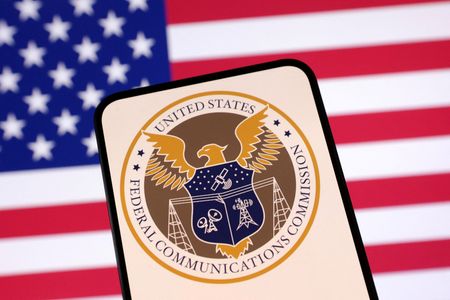By David Shepardson
WASHINGTON (Reuters) – The Federal Communications Commission will vote on May 22 to finalize a rule that will bar Chinese labs deemed a risk to U.S. national security from testing electronic devices like smartphones, cameras and computers for use in the United States.
All electronics used in the United States must go through the FCC’s equipment authorization process before they can be imported.
“We’re addressing another potential loophole in our national security process by ensuring that only trustworthy labs can participate in our process,” FCC Chair Brendan Carr said in an interview.
The FCC in November 2022 banned approvals of new telecommunications equipment from Huawei and ZTE, as well as telecom and video surveillance equipment from Hytera Communications Corp, Hangzhou Hikvision Digital Technology and Zhejiang Dahua Technology Co. FCC staff estimate that roughly 75% of all electronics are tested at labs located inside China.
“If you have an untrustworthy lab that is supposed to be making sure that Huawei or ZTE equipment isn’t sneaking into the country, that’s potentially a problem,” Carr said.
The companies did not immediately respond to requests for comment.
The order will ban testing by labs in China subject to control or direction from companies on the FCC’s “Covered List” that deems specific communications equipment and services pose a threat to U.S. national security. Under the rules, the FCC would withdraw its recognition of labs if it determines they are tied to a prohibited company.
The agency is also seeking comment on a separate proposal to expand the testing prohibition to all labs in China and other foreign adversaries, and wants input on how the FCC can incentivize testing and construction of new labs in the United States.
The FCC also plans to vote to advance a proposal to require entities with significant ties to China or other foreign adversaries to disclose all licenses and authorizations from the FCC. It would require collection of details on hundreds of thousands of licenses including all broadcast, equipment authorizations, submarine cable licenses and many others.
Carr said the FCC proposal is modeled on legislation in Congress. “If you’ve got a sufficiently concerning tie back to a foreign adversary, that data should be easily accessible to the FCC,” Carr said.
In March, the FCC said it is investigating nine Chinese companies including Huawei, Hikvision China Mobile and China Telecom to determine if they are seeking to evade U.S. restrictions.
(Reporting by David Shepardson; Editing by Bill Berkrot)











